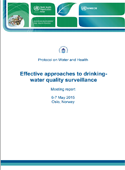Effective approaches to drinking-water quality surveillance

Download
2015
Meeting report (English with Russian summary)
The meeting was organized by the WHO European Centre for Environment and Health of the WHO Regional Office for Europe in support to the implementation of the Protocol on Water and Health to the Convention on the Protection and Use of Transboundary Watercourses and International Lakes. The programme of work for 2014-2016 under the Protocol prioritizes supporting cost-effective and risk-based drinking-water quality surveillance approaches. The objectives of the meeting were to introduce key elements of risk-based surveillance, review countries' current approaches, experiences and challenges in water quality surveillance, identify needs to build capacities for strengthening surveillance systems. The meeting recognized the value of and need for risk-based approaches in standard-setting and drinking-water quality surveillance as it leads to targeted and resource-effective approaches and thus to better protection of public health. Regulations need to allow for flexible surveillance schemes that are based on local risk assessments. The outcomes of water safety plans, developed and implemented by water suppliers, inform local decision-making in terms of priority risks and direct the scope of surveillance efforts.



